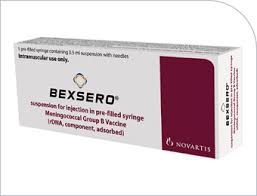From tomorrow (1 September), the MenB vaccine is introduced to the routine childhood vaccination programme in Scotland.
Scotland is now one of the few nations in the world to offer the vaccination, which will offer protection against the life-threatening strain of meningitis to all infants.
The vaccination will be given in three doses at two, four and 12 months, with all infants in Scotland who are aged two months when the vaccine is introduced being eligible. The Joint Committee on Vaccination and Immunisation (JCVI) has also advised that there should be a one-off, catch-up programme for infants aged three and four months of age who will be attending for their routine vaccinations when the programme starts.
Infants under one year of age are most at risk of MenB and the number of cases peak at around five months of age.
Health Secretary Shona Robison said:
“We’re delighted to be one of the first countries in the world to introduce a nationwide Men B vaccination programme to help tackle the effects of this disease, which can be devastating for children and their families.
“The Scottish Government has been consistent in its support for the introduction of this vaccine, which underlines our commitment to ensuring the health and wellbeing of our children.
“Around 1,200 people – mainly babies and children – get meningitis B each year in the UK, and around one in 10 die from the infection.
“The programme will offer families in Scotland extra peace of mind at what should be a such a happy time in their lives.”
CEO at Meningitis Now, Sue Davie said:
“We’re delighted to reach this milestone and see this vaccination programme moving forward, protecting our newborn babies in Scotland. This will save lives straight away and for years to come.
“Today’s announcement is a tribute to the tireless and selfless efforts of our supporters, for many of whom it sadly comes too late. We stand ready to support the Scottish government and help with the roll out in any way we can.”
Meningitis Research Foundation Scotland Manager Mary Millar said:
“We are delighted with the introduction of the new MenB vaccine as it has been at the top of this charity’s agenda for many years and our research contributed to the development and adoption of the MenB vaccine in the UK.
“We hope this vaccine will save many lives and spare countless families the trauma of seeing a loved one die or become seriously disabled because of MenB.
“However we must remind the public that there are still some forms of the disease which are not covered by vaccines so it is vital that people are still aware of the symptoms of meningitis and septicaemia.”
Alan Glynn from Perth, whose daughter died from meningitis said:
“My daughter Alexis Rose contracted Meningococcal Group B Meningitis in 2011 when she was 19 months old. The week before Alexis Rose died, she and her twin sister were ill with sickness and diarrhoea. Towards the end of the week, although the girls still had diarrhoea they were on their feet, eating and drinking and sleeping well.
“But Alexis seemed tired out. We gave her a shower and put her in a sleep suit. Her temperature was fine and there was no sign of a rash. She went to sleep after the second attempt with a bottle and we thought no more about it – we were glad she was resting.
“Later, when I passed Alexis and touched her face, she stirred in her sleep, but didn’t seem troubled or fevered at all. It was the last time we saw her alive.
“Whilst this is a historic day in the battle against meningitis and septicaemia, and I hope many lives will be saved, there is still the wider war to fight against other strains of the disease. I would urge parents to be vigilant of the symptoms, particularly if their child seems to be unwell with another minor illness.”






